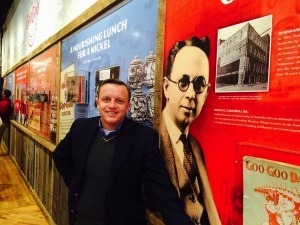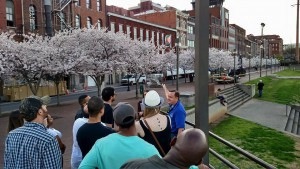Ask a public historian: Jeff Sellers
28 March 2016 – editors

Jeff Sellers standing in front of a panel at the Goo Goo Exhibit. Photo credit: Jeff Sellers
Jeff Sellers serves as the curator of education at the Tennessee State Museum in Nashville, TN, and has been there since 2005. He is past-president of the Inter-museum Council of Nashville and currently serves on the National Council On Public History New Professional Award Committee. In 2012, he started a historical walking tour business, Echoes of Nashville Walking Tours, LLC. He has served on several boards and organizations in the community and is having the time of his life helping raise two kids with his wife, Tammy.
What was your career trajectory?
I came into the field in a very traditional way. Taking the advice of my parents, I wanted a career that I enjoyed, and so my major was never anything but history. Back then, you told someone you were majoring in history, and you’d get asked “What are you going to do with that?”
After earning my Master’s degree in education and teaching for a year, I realized that, while I loved teaching students how to grapple with historical topics, I felt my calling went beyond the classroom. I remember walking into school every day thinking, “Wow, it would really be cool if I was walking into a museum.”
After a lot of deliberation, I decided to apply for graduate school in public history at Middle Tennessee State University (MTSU) and move to Murfreesboro. I quickly realized I had found my passion. Within a month, I landed a job as a tour guide at a house museum.
While in graduate school, I slowly built a network of friends and colleagues and involved myself in as much as I could while keeping up with my coursework. In my last summer, someone I’d met while at MTSU hired me as a seasonal interpretive ranger at Stones River National Battlefield. There, I met the person that would become my future boss at the Tennessee State Museum.
By the end of that summer, my life course had changed again because I had a wife and baby on the way with no permanent job! A museum program assistant job opened that fall at the Tennessee State Museum. I applied and, during the interview, they suggested that I apply for the managerial job, museum program coordinator. I did and was hired.
I was later promoted to Curator of Education, the position I hold today, on the strength of my Master’s degrees in education and public history.

Jeff Sellers giving a tour. Photo credit: Jeff Sellers
What was the biggest opportunity that you accepted?
Probably choosing to step out and move away to graduate school at MTSU. Thinking back, I’m not sure how I decided to do it! I grew up in Alabama and lived there all my life. If I had stayed, I could’ve had a comfy existence as a teacher in my home state. When I packed my car and moved to Tennessee, I knew no one in the entire state. That was scary but exciting. It was such a huge decision to step out of my comfort zone and try something new. For me, that time in my life was a Robert Frost moment, two roads diverged. Which would I take? I chose to step out, and it has made all the difference.
Who is the “public” in your position? How do you engage them?
The “public” is anyone that I and my team can help connect to the world of our shared past so hopefully they can have a better understanding of themselves and their place in the world today. Specifically, we interpret the Tennessee State Museum and State Capitol for everyone, from international guests who have little knowledge of Tennessee to repeat guests who visit us yearly.
But my heart still lies with schools–those Tennessee children, teachers, and families. That’s my public. It’s so rewarding to tell the story of Davy Crockett or Andrew Jackson’s duel or the heartbreak of the Trail of Tears.
What advice can you give to people who want to apply for state-funded positions?
Do things others won’t. It may seem that there’s an impenetrable wall of bureaucracy. However, behind that, there are real people that are passionate about their jobs. Get to know them. Find a way to submit a resume or better yet write them a letter (no one does that anymore) expressing how much you’d like the opportunity to interview. Find a mentor. Ask to meet for career advice. Our schedules are busy, but we can make time for a cup of coffee and a 15-minute chat.
Secondly, don’t give up. If your heart is set on one institution or organization, keep trying. I’ve hired someone that we skipped in two other hiring processes. However, the third time we hired her, and she has proven to be one of our best hires.
What are the top pros and cons of working for a government agency?
The pros of a government agency are that they typically have a larger structure so that means you have many professional people working alongside you. They may also have more resources to support internal initiatives. These larger state-supported institutions also reach a broad audience because of employees’ role as public servants.
Conversely, that same rigid structure can sometimes appear to limit flexibility and creativity. It sometimes forces us to work harder to get new ideas and opportunities through the bureaucracy.
Any good resume tips specific to your field?
Yes, get out and do stuff. Volunteer. Join that local museum organization. Attend special events even if you have to go by yourself. I may be different, but when I look at a resume, I want to see it look clean and organized to be sure, but I want to see work in the field. I want to see volunteer work in public history. I want to see some cool projects that perhaps helped you gain good insight. I’m not the formatting and style police. If you look good on paper, I want to see you in person. The resume is simply a ticket to sit down for the interview. It’s one step. An important step but only one step.
Any other advice for those who want to do museum work?
Read. Read the latest in museum books but also read other books outside the field. Leadership books. Business books. The field of public history is extremely diverse. Don’t be a one-trick pony. After all, perhaps right now, you are a young professional looking for a museum job. However, in the near future you may be leading a staff full of museum professionals. Those of us in the field need good young leaders with fresh ideas.
~ This is the third in our series “Ask a Public Historian,” brought to you by NCPH’s New Professional and Graduate Student Committee. Follow the committee on Twitter at @NCPHnewgrad. You can find more “Ask a Practitioner” posts here.



